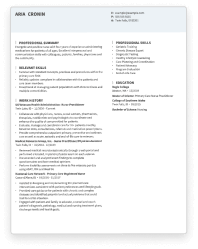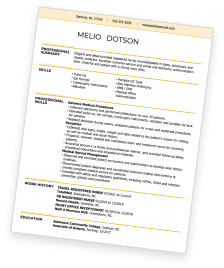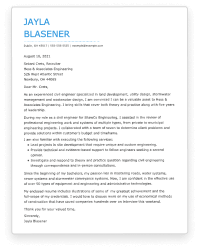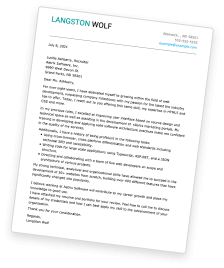Law Resumes: Overview
Legal professionals play a vital part in upholding the laws of a society. Their responsibilities include providing legal counsel, representing clients, researching case laws, negotiating settlements, and ensuring adherence to legal standards.
Within the legal sector, there are several different professions you could pursue. These include:
- Attorney
- Paralegal
- Legal Analyst
- Judge
- Legal Consultant
For legal professionals to succeed, excellent communication, critical thinking, and attention to detail are crucial. In many cases, these skills must often be coupled with a law degree and a state license.
With our help, you can be sure to craft the perfect resume that reflects these qualifications and scenarios. Check out our professional resume examples and use our online resume builder and resume templates to take your job application to the next level!
Law Resume Example: Legal Attorney
This legal resume sample for an attorney follows many resume writing best practices, making it a model example if you want to win favor with potential employers.
-
Brevity:
Succinct language helps to ensure that all the important information fits on one page and is easy to digest. Bullet points also serve to keep the content concise and scannable.
-
Clear Section Divisions:
The use of bolding and subtle color makes it easy to distinguish between different resume sections and quickly navigate to information of interest.
-
Quantifiable Information:
The candidate quantifies achievements with phrases like “15% faster than usual” and “provided guidance to 14 staff members”, making their impact more meaningful and tangible.
-
Clean Layout:
Consistent formatting and a decent amount of white space enhance readability and minimize distractions so that the content remains the star of the document.
Law Resume Example: Legal Services Director
With a striking design and compelling content, this Legal Services Director resume example is a great template if you, like the candidate, have an inconsistent career history.
-
Prominent Header:
The candidate’s name and contact information are clearly and colorfully displayed at the top of the resume, so hiring managers will have no trouble getting in touch for an interview.
-
Concrete Examples:
Relevant skills aren’t just listed but proven with clear examples of how they have been applied in the past to achieve positive results.
-
Consistent Alignment:
Text and bullet points are all consistently aligned to the left, giving the document a neat and organized appearance.
-
Balance of Hard and Soft Skills:
By highlighting both technical skills, like data entry, and soft skills, like communication and multitasking, the applicant shows that they’re a well-rounded professional who can thrive in the workplace.
How to Write a Law Resume: A Step-by-Step Guide
Ready to craft a document as strong as the sample legal resumes above? Learn more about key sections to include and what to cover in each below and in our detailed, step-by-step resume writing guide.
-
Choose a Format:
There are three types of resume formats, and you should pick the one that best fits your needs as a legal professional. The chronological resume format is the most common and focuses on job history.
The functional resume format is less common and not as ATS-friendly, however, it is good for those with less experience, like recent high school graduates, because it focuses on transferable skills. Finally, there is the combination resume format, which uses elements from both the chronological and functional approaches.
-
Contact Information:
Begin by creating a contact details section right at the top of your resume. Foreground it with your full name and also include your email address, phone number, general location (city and state), and links to your professional website, portfolio, and LinkedIn profile, if applicable.
-
Summary or Objective:
Give your resume some energy with an introduction that explains why you are a worthy and valuable candidate. A resume summary, typically comprised of 2-3 sentences, spotlights your relevant background, proficiencies, and the value you bring to the role as a law professional.
An objective statement meanwhile is better if you lack relevant experience, but have the passion for the position. Select the one that aligns with your circumstances and tailor it for each distinct job application.
-
Work History:
Detail past and current positions in reverse chronological order in your work history section. Start with your most recent role, and list the name and location of the law firm or company, your job title, and the dates of employment for each job. Do your best to list the most relevant responsibilities and achievements with quantified data to strengthen your credentials.
-
Skills:
Highlight the legal and administrative competencies that set you apart from peers in a dedicated skills section. Select six to eight skills that align best with the role you’re applying for, and present them in a scannable format using bullet points.
-
Education:
Showcase your qualifications by outlining your academic background and achievements relevant to law, starting with your highest degree (for example, a Juris Doctor (J.D.) or LLM). Note the title of the degree and the name of the awarding institution.
-
Additional Sections (optional):
If you have the space, include any additional relevant qualifications such as certifications (if you want to spotlight these separately from your foundational education), awards, notable cases, professional memberships, or relevant hobbies.
Key Skills and Certifications For Law Resumes
Employers in the legal field will be scanning resumes for specific skills and credentials that indicate expertise in their work area. Below, you’ll find some of the top hard skills and soft skills that hiring managers look for in law candidates and notable legal certifications that’ll make your resume stand out.
Top 5 Hard Skills for Law
- Legal Research: Proficiency in legal research techniques, tools, and databases supports thorough case preparation and the development of strong arguments.
- Litigation: Understanding courtroom etiquette, case strategy, and trial preparation practices ensures that legal professionals can effectively advocate for clients in court.
- Contract Drafting: The ability to meticulously draft and review contracts and other legal documents helps protect clients from legal disputes and ensures agreements are legally sound.
- Technical Proficiency: Familiarity with legal technologies and software programs improves efficiency and productivity, and streamlines document management, research, and case organization.
- Specialized Legal Knowledge: In-depth knowledge of a particular legal field (such as tax law or environmental law) is vital for navigating complex regulations and providing expert counsel to clients.
Top 5 Soft Skills for Law
- Verbal and Written Communication: Effective and persuasive communication underpins successful client interactions, negotiations, and courtroom presentations, and ensures that legal arguments are compelling.
- Attention to Detail: An eye for detail helps law professionals avoid legal document errors, ensuring legal work’s accuracy and validity.
- Time Management: A talent for managing time effectively ensures client needs are met timeously, documents are filed promptly, and legal professionals remain organized under pressure.
- Problem-Solving: Strong problem-solving skills are critical for finding innovative solutions to legal challenges and navigating complexities efficiently.
- Teamwork: The ability to collaborate seamlessly with colleagues, support staff, and experts helps with achieving common goals and delivering comprehensive legal services.
Top 5 Certifications for Law
- Certified Paralegal (CP): Considered the national professional standard for paralegals, this credential recognizes practitioners who have proven their ability to offer assistance in the legal services field.
- Certified Legal Professional (CLP): This designation is aimed at lawyer’s assistants and verifies expertise in office administration, a commitment to professionalism, and knowledge of procedural law and legal documents.
- Certified Information Privacy Professional (CIPP): Ideal for legal professionals involved in privacy law, the CIPP certification validates knowledge of data protection regulations and practices.
- Criminal Trial Law Certification: This prestigious board certification indicates specialist skills required to defend and prosecute crimes in court contexts.
- Certified Legal Specialist: Many state bar associations and legal organizations offer other specialized certifications that demonstrate expertise in specific areas of law (for example, juvenile law, family law, and patent litigation).
Highlighting these types of skills and certifications is a great way to showcase your qualifications on your legal resume. However, always ensure that the skills and certifications you focus on are relevant and tailored to the job.
Helping Job Seekers Like You
8 Tips For Writing A Law Resume
- Start Strong With a Persuasive Summary: Showcase your communication skills immediately with a convincing introductory statement that captures your unique value proposition. Highlight your key strengths and back them up with achievements to show what you can bring to the table in just three or four sentences.
- Customize Your Content: Every job is different, so submitting a slightly different resume for every application is important. Show prospective employers that you can meet their unique needs by tailoring every section of your resume to align with the position’s specific requirements.
- Emphasize Interpersonal Skills: While hard skills like legal research and writing are central to success in law, legal professionals rely heavily on soft skills, too. Highlight people skills like communication, active listening, empathy, and cultural sensitivity to illustrate your ability to work well with clients and colleagues.
- Include Bar Admission Details: Prospective employers will want to know that you can work in their location. Mention the state(s) where you’re licensed to practice law and your admission date(s).
- Avoid Excessive Use of Color and Graphics: Law is a fairly traditional and conservative field, so avoid elaborate designs and decoration. This can make your resume appear unprofessional and distract from its content. It can also confuse Applicant Tracking Systems (ATS) and lead to your resume not being scanned correctly.
- Highlight Continuing Legal Education (CLE): Mention any workshops, specialized courses, or CLE credits you’ve completed, especially if they align with the job requirements. This signals your commitment to professional growth and to staying up to date with legal trends and developments.
- Use Bulleted Lists: Hiring managers are busy people who don’t have the time to read through lengthy paragraphs of text. Use bullet points to facilitate quick scanning and make your achievements and responsibilities stand out.
- Get a Second Opinion: Consider having a friend or colleague review your resume for feedback. They might pick up typos or grammatical errors you’ve missed and have valuable suggestions for improvements you can implement.
Similar Resume Examples


Save Time With Hloom's Resume Builder
Key Takeaways
Look at strong resume examples for legal professionals and law enforcement practitioners and take note of best practices to apply in your own document.
Choose a chronological format if you have many years of experience in law and a functional or combination format if you recently graduated or are changing careers.
Highlight both hard and soft skills to show that you’re a well-rounded professional who has job-specific expertise and works well with others.
List relevant certifications to enhance your credibility in the legal field and demonstrate proficiency in specific areas of law.
Use clean and simple formatting and a well-organized layout to make your resume easy to read and to align with legal industry norms and expectations.
More Resume Examples
Save Time With Hloom's Cover Letter Builder


Law Resume FAQ:
Citations
- American Bar Association, “Standing Committee on Specialization.”
- Bureau of Labor Statistics, “Paralegals and Legal Assistants,” Occupational Outlook Handbook, September 2023.
- Bureau of Labor Statistics, “Judges and Hearing Officers,” Occupational Outlook Handbook, September 2023.
- University of Michigan, "Resume Resources," November 2023.
- University of Notre Dame, “Resume Guide,” The Law School.




